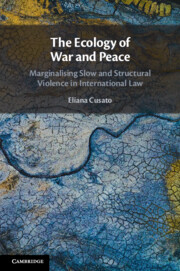Book contents
- The Ecology of War and Peace
- The Ecology of War and Peace
- Copyright page
- Contents
- Acknowledgements
- 1 Introduction
- Part I Concepts, Theories, and Debates
- Part II The Practice of International Law
- 4 War Crimes Tribunals and the International Court of Justice: Nature between Property Protection and Humanitarian Concerns
- 5 The United Nations Security Council
- 6 Truth Commissions
- 7 Conclusion
- Bibliography
- Index
4 - War Crimes Tribunals and the International Court of Justice: Nature between Property Protection and Humanitarian Concerns
from Part II - The Practice of International Law
Published online by Cambridge University Press: 03 September 2021
- The Ecology of War and Peace
- The Ecology of War and Peace
- Copyright page
- Contents
- Acknowledgements
- 1 Introduction
- Part I Concepts, Theories, and Debates
- Part II The Practice of International Law
- 4 War Crimes Tribunals and the International Court of Justice: Nature between Property Protection and Humanitarian Concerns
- 5 The United Nations Security Council
- 6 Truth Commissions
- 7 Conclusion
- Bibliography
- Index
Summary
Chapter 4 delves into the practice of the international judiciary and, specifically, international war crimes tribunals and the International Court of Justice (ICJ). By analysing the approaches of post–World War II tribunals, the committee established to review the 1999 NATO bombing campaign in the Former Yugoslavia, the Special Court for Sierra Leone, and the International Criminal Court, the first part of the chapter reflects on the conceptual, normative, and practical limitations of international criminal law. The second part provides a critical reading of two important ICJ cases, the Nuclear Weapons Advisory Opinion and the Armed Activities case (Congo v. Uganda), dealing respectively with the ecological devastation of nuclear weapons and pillage of natural resources in the Congo. The chapter ultimately contends that international justice, both in its criminal and inter-state dimensions, is concerned about individual/state agency, quantifiable harm, and its proximate causes. Thinking in these narrow terms about the ecological impacts of militarism and resource extraction associated with conflict fails to grasp the structural dimensions of the problem, the plurality of actors involved, and the obligations owed to other human and non-human beings.
Keywords
- Type
- Chapter
- Information
- The Ecology of War and PeaceMarginalising Slow and Structural Violence in International Law, pp. 105 - 152Publisher: Cambridge University PressPrint publication year: 2021

